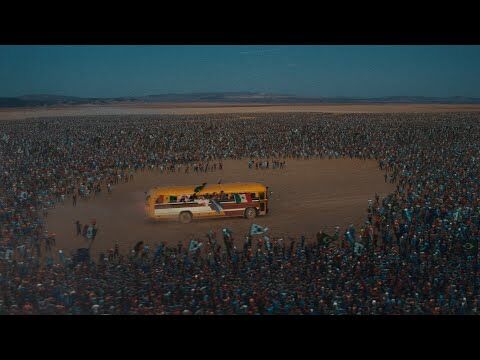The 2022 FIFA World Cup in Qatar has its anthem.
With the tournament just days away, FIFA dropped the song “Tukoh Taka,” which features Nicki Minaj, Maluma and Myriam Fares, on Friday.
In the music video, the trio party in the desert, playing off host country Qatar’s arid environment. Arriving on a bus stuffed with an array of revelers waving the flags of their nations, Minaj kicks off the song’s first verse with a mix of Spanish and English bars:
“Me, soy Trini / Everyting di man have, dat a fi mi / ¿Dónde está el dinero? Papi, gimme / Pretty face, ugly gyal can’t see me.”
Lebanese singer Myriam Fares joins the party accompanied by a host of dancers grooving to her Arabic verses and the catchy “Tukoh Taka” chorus. During Maluma’s verses, the Colombian artist appears in colorful desert music festival attire.
Spliced between the artists are clips of players celebrating goals, including players from Maluma’s native country lining up to salsa on the pitch.
Last month, sponsor Budweiser released its own World Cup promotional song, “The World Is Yours to Take” by Lil Baby. The song samples Tears for Fears’ “Everybody Wants to Rule the World.”
Other musical acts performing during the tournament include Calvin Harris, Diplo, Black Eyed Peas and J Balvin.
Some musical acts have rejected opportunities to perform at the global sports tournament, including Dua Lipa and Rod Stewart. Lipa said she will “look forward to visiting Qatar when it has fulfilled all the human rights pledges it made” when it became host.
News leadingup to the World Cup has been colored with controversy around concerns of labor conditions and poor treatment of the thousands of migrant workers who rushed to build Qatar’s stadiums and other venues. Some human rights group say there have been thousands of unexplained worker deaths.
“Migrant workers were indispensable to making the World Cup 2022 possible, but it has come at great cost for many migrant workers and their families who not only made personal sacrifices, but also faced widespread wage theft, injuries, and thousands of unexplained deaths,” said Rothna Begum, senior researcher at Human Rights Watch, calling for compensation for the dead workers’ families.

